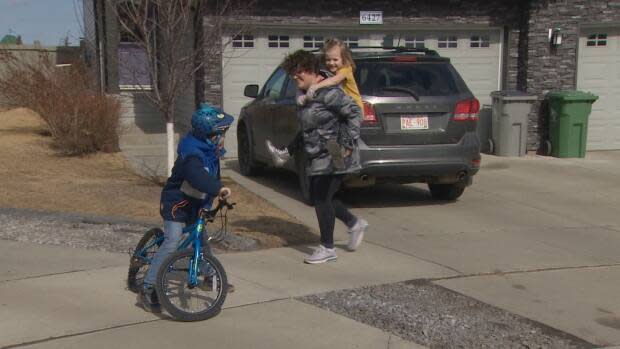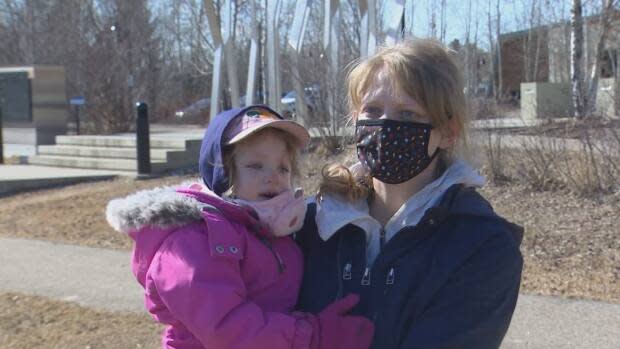Proposed Alberta curriculum baffles parents, sparks protests

Some parents say they're angry and bewildered by the content of a new elementary school curriculum proposed for Alberta children.
"I think this is the stuff of parents' nightmares, honestly," Beaumont parent Taylor Schroeter said on Tuesday.
She's now an administrator on a Facebook Group, Parents Against Alberta's New Curriculum Draft, which attracted more than 7,000 members in its first 24 hours.
"I, for one, don't plan on taking this lying down," she said.
Although some parts of Alberta's current school curriculum are dated, Schroeter says her seven- and nine-year-old children are engaged and interested in their classes.
That will be at risk, she says, should teachers be required to regale young children with lessons about ancient Rome, Chinese dynasties, the spice trade and Genghis Khan.
The proposed social studies outcomes are age-inappropriate, and would be nearly impossible for teachers to deliver in 20-to-30 minutes a day, she said.
Parents should be angry about this, she says, and she hopes they speak up.

Many parents and educators have expressed outrage online and penned letters to MLAs since Education Minister Adriana LaGrange unveiled the proposed K-6 curriculum on Monday.
LaGrange said voters told her government they wanted to dispense with educational fads and return to traditional methods of teaching, including an emphasis on acquiring knowledge, numeracy and literacy, and practical skills.
After inheriting the curriculum redevelopment process from the former NDP government, the United Conservative Party government brought in hand-picked advisers to rework some of the existing material.
But curriculum experts say the latest iteration of the document is Eurocentric, dismissive of Indigenous perspectives, and not based on research about how best to teach young children.
Parents and teachers heaped on more criticism Tuesday, saying the government's latest attempt is unacceptable. Organizers have planned protests outside the legislature and LaGrange's constituency office in Red Deer.
Not enough teacher input, educator says
Edmonton parent Amanda Waters said she began composing letters to her MLA and LaGrange, saying the dense historical material proposed for second-grade social studies is irrelevant to her three young children.
"I think it sounds very unreasonable," she said. "It's far too much for them. I really feel like it's going to burn out their desire to learn."
Chelsey Wood, a teacher and the parent of a toddler, says she used to be excited for the new curriculum before teachers were cut out of the writing process. She's pleased to see an increased focus on literacy and numeracy skills, but has concerns about many of the proposals.
"There wasn't a huge input from teachers and people who were actually in the classroom, so I think we're not exactly on the right track to deliver the things we should be in the way we should be doing it," she said.

Tess Owen, an Edmonton elementary school teacher and parent of two children age 10 and eight, says the draft proposes to remove lessons about being a good citizen and community member.
World history lessons are developmentally inappropriate for seven-year-olds, who are still grasping the concepts of their city, town, and province, she said.
She said mandatory outcomes about religion in the early grades are "scary," and she doesn't like that Christian views are favoured in the curriculum.
She's concerned children will be asked to memorize and regurgitate facts instead of thinking critically and asking questions about why and how events happened.
"As a parent, that's really disturbing. Because what I want my kids to do is to be leaders, not followers," she said. "And this is not a curriculum that will deliver that."
The content neglects to consider students learning English, newcomers, students with learning disabilities and other challenges, she said.
Online town halls coming in April
The drafts also worried Tracey Kinniburgh, a St. Albert parent who became an unplanned homeschooler during the COVID-19 pandemic.
With her second grader doing school online, a kindergartener doing home education and a three-year-old running around, she has a new appreciation for the amount of work it takes to educate young kids.
She spent Monday night devouring some of the curriculum proposals for the early grades and concluded the lessons are overwhelming and inappropriate.
She questioned how a child who is just learning how to write five-word sentences could meaningfully understand lessons about the Mongolian Empire.
She said she also has concerns that the curriculum favours a Christian, Eurocentric point of view, and uses "coded language" to send messages about values.
"It does upset me," she said of the proposals. "It doesn't appear to be a bipartisan curriculum."
Kinniburgh was happy to see increased inclusion of financial literacy and computer coding and hopes schools will be provided with adequate resources to teach these topics well.
The government is asking for public feedback on the curriculum drafts in an online survey, and also plans to hold four virtual town halls in April.
They have allotted $6-million this year to begin classroom testing of the new curriculum, which will begin in about 10 per cent of schools in September.
The new K-6 curriculum is slated to be mandatory in all elementary schools starting in September 2022.

